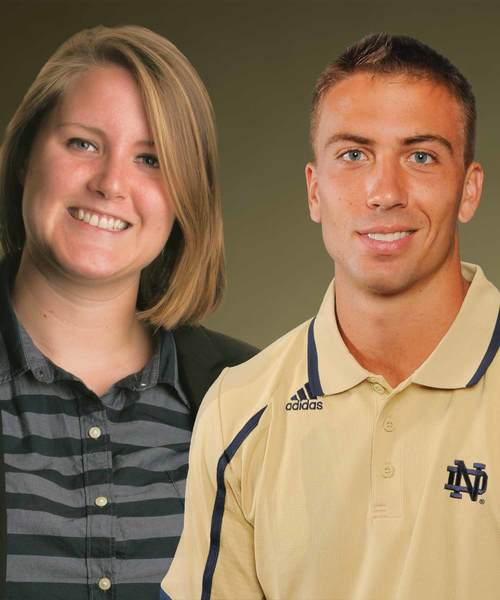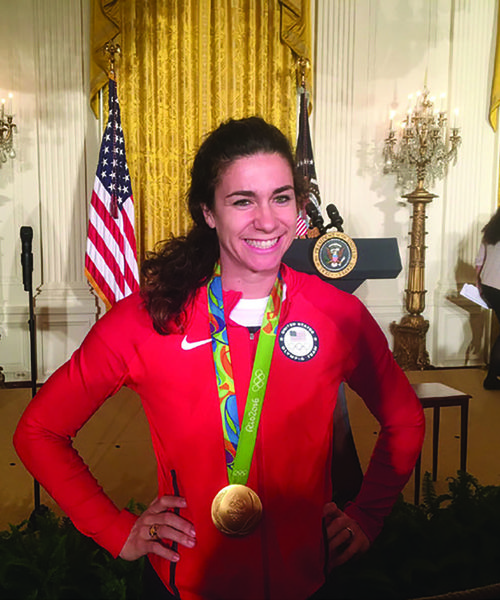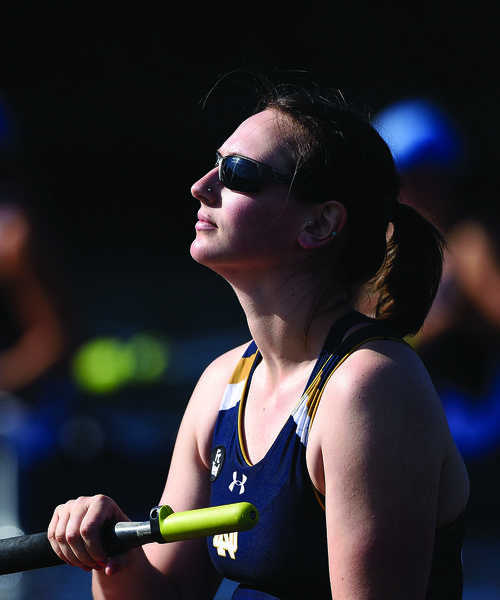
Matt Dooley & Olivia Kacsits
Notre Dame game-changers
They met in microbiology, each carrying a secret that would ultimately link them forever. On the outside, they seemed to be like all the other students in the class—and every other young adult at the University of Notre Dame. But on the inside, they were both struggling with the unshakable feeling that they didn’t belong.
Matt Dooley and Olivia Kacsits would eventually become the faces of Notre Dame’s You Can Play initiative—as the first publicly gay and lesbian student-athletes in the history of the school. But, back then, they were just two student-athletes sitting side by side, trying to get through a class.
“This was our junior year, and he was going through a lot during the time we had class together,” says Kacsits, a four-year member of the Irish rowing team. “And I so wish I had known that because I think we could have been a really good resource for each other.”
A year earlier, after years of wrestling with his sexual identity, Dooley, who played tennis for Notre Dame, attempted suicide at school and was hospitalized. A sophomore at the time, Dooley chose not to leave a note.
“I was in a place where I didn’t think I would be missed,” he says. “I feared death and disappearance less than I feared abandonment and being alone.”
So great was Dooley’s dread of abandonment, he purposefully isolated himself from his family members, not speaking to them for months after his attempt despite their increasing desperation to find out what had happened.
More alone than ever in the aftermath, what Dooley didn’t know was that someone else—just a desk away in microbiology—shared his fears and loneliness.
“Coming to Notre Dame, you have this sense that it’s not something that happens because it’s a conservative, Catholic university,” says Kracsits, who received her degree as a preprofessional major in the College of Science in May 2014. “At least that’s the stereotype. I didn’t find that to be necessarily true by the time I graduated, but there was definitely this thought that it wasn’t something that could be talked about. I certainly didn’t feel like there was a place for me, at least coming in as a freshman and not knowing much about Notre Dame culture.”
Early in her time at the University, she recalls having the ominous sense she shouldn’t mention her sexuality for fear her spot on the rowing team might be jeopardized. Though Kacsits later would discover those fears were unfounded, Dooley agrees the perception of Notre Dame as a Catholic stronghold in a country struggling to define gay rights made things difficult. Both student-athletes, however, found their initial perceptions didn’t exactly match reality.
“Notre Dame is obviously not an easy place to be gay,” Dooley says. “But what people don’t always understand is that the student population doesn’t line up with the popular conception of the place.”
When Dooley, who earned his degree as a science-business major in the College of Science last spring, came out to his coach and teammates, he says it changed his life. Not only did they embrace him, but Dooley’s teammates also created an environment in which he knew he was safe and allowed him to start to accept himself. Similarly, Kacsits describes her team as open and encouraging, recalling that both teammates and the coaching staff made themselves available for support.
“I think a lot of people have this idea of Notre Dame, but I think if you ask the student body, people are a lot more open and willing to talk to you about it,” she says. “They might not agree, but I never felt anything hateful.”
These misconceptions of Notre Dame’s culture were what prompted both Dooley and Kacsits to come together during their senior year. Dooley, whose fears had once led him to attempt suicide, felt strongly that sharing his story might save lives. Kacsits suggests that although her experience was less debilitating, she felt an urgent need to let others know they weren’t alone.
With the help of the Office of Student Welfare and Development in the Notre Dame athletics department, the two seniors bounced around ideas on what shape their effort would take. Originally, they both liked the idea of an anonymous email account that students could use if they were feeling overwhelmed or needed to talk.
And then You Can Play emerged.
You Can Play is a social activism campaign dedicated to ensuring equality, respect and safety for all athletes, without regard to sexual orientation. Centered around the slogan, “If you can play, you can play,” the movement began in 2012 to honor the memory of Brendan Burke, a student manager for the Miami University hockey team. He had worked to increase acceptance of the gay community in hockey before dying in a car accident.
“You Can Play is purely based on respect,” Dooley says. “We saw this as an opportunity to have this initiative that doesn’t take a political stance. It’s a universally accepted message that everyone deserves respect.”
The campaign’s signature is a series of videos produced by each college in the program. Student-athletes from multiple teams at a school come together to express that anyone who can play is safe and welcome to compete, regardless of sexual orientation.
The first step in getting the campaign off the ground was for Dooley and Kacsits to speak with each of Notre Dame’s 26 varsity athletic teams and invite participation. Coming out to friends and family is one thing, but exposing that truth to a whole University is another beast entirely.
“I didn’t know what to expect going in,” Dooley says. “I love my University and playing for them—I miss it more than anything. It was my life. So going forward was a risk, and I was scared. But it was nice to see that Notre Dame would do the same for me that I had been doing for them. Every match day, I’d put their name on my back and fought as hard as I could. And when it was their turn to do it for me, they returned the favor in full and didn’t shy away from it.”
It wasn’t just that Notre Dame didn’t back away from You Can Play—it was that the athletic department put the video front and center.
After meeting one on one with Dooley and Kacsits, vice president and director of athletics Jack Swarbrick agreed to provide voiceover and be featured in the You Can Play final shot. Swarbrick says he was moved to action by the courage of Kacsits and Dooley.
“They were taking leadership on such an important issue—an issue that would show our values,” he says. “That made it so easy to say, ‘Let’s figure this out.’ They represented the essence of this University. It’s about seeing the image of God in everyone, and that’s fundamentally who we are. Service. Faith. Family. It was all embodied in this. It was the ultimate representational project.”
“Notre Dame’s video has a different context,” Kacsits says. “Stanford has a great You Can Play video—it’s not to say that their video isn’t as impactful. But the fact this came from a conservative university that’s struggled with sexual orientation and things like that, I think gives it a different kind of magnitude. I don’t think it would have had the same impact somewhere else.”
Kacsits witnessed this influence when she encountered a young woman who graduated from the University in 2004.
“She went to see a counselor when she was a student because she was going through these changes and didn’t know what they were,” Kacsits says. “She told the counselor, ‘I think I might be gay.’ The reaction she received was less than positive.
“She got really emotional when we were talking about the video. She said something to the effect of, ‘It was incredible for me to see, 10 years after I’ve left, that we have a video like this. That it has the Notre Dame emblem on it. Because the fact it has the Notre Dame emblem on it means somebody higher up had to approve it to make it available.’ So it meant a lot.”
For Kacsits and Dooley, this influence on someone’s life—even a decade after she’s left the University—is exactly what they set out to accomplish with You Can Play because the program is consistent with Notre Dame’s mission as a Catholic institution, which asks students to love one another and create a safe, welcoming and inclusive environment.
When students are admitted to the University, the first line of their acceptance letter reads, “Welcome home,” a theme highlighted in the Notre Dame You Can Play video.
“The admission packet says, ‘Welcome home,’” Kacsits says, overwhelmed at the realization student-athletes, coaches and administrators were making Notre Dame a welcome home for gay and lesbian students.
“At Notre Dame … I’m going to cry.”
She pauses.
“At Notre Dame, we find community and it’s really indescribable. You can’t find it anywhere else. It’s this expectation of, when you’re there, you’re family. I think that’s what I miss the most.”
For two students who once felt utterly alone, there is now the chance to be connected to so many others—an opportunity created by their own courage. And, while that sense of belonging has always been a part of Notre Dame, Dooley and Kacsits helped make it a reality for those who did not always feel welcome.

